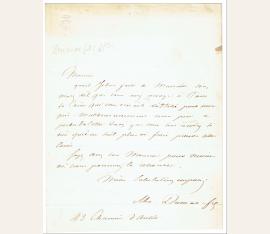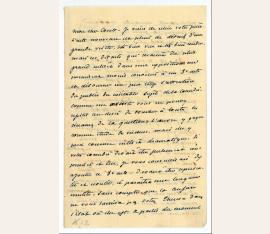Schriftsteller (1824-1895). Eigenh. Brief mit Unterschrift. ohne Ort „49 Chamin d Autin“. 8vo. 1 p. Blindgepr. Briefkopf.
250 €
(89746)
Schriftsteller (1824-1895). Eigenh. Brief mit U. O. O. u. D. 2 ½ SS. 8vo.
2.000 €
(936539/BN936539)
In französischer Sprache. Beurteilt ein ihm zuvor zugesandtes Stück.
French writer (1824-1895). "A Monsieur Gustave Rivet. Député". Partly autograph manuscript signed. No place. 4to. 88 pages.
4.500 €
(73832/BN47726)
Corrected proofs for an article by Dumas, couched as an open letter addressed to the deputy Gustave Rivet, who had proposed legislation requiring investigations into the paternity of illegitimate children. An interesting document about the history of French social legislation at the end of the 19th century, containing substantive corrections and the author's signature; several pages are entirely handwritten. - With his bill, Rivet had pushed for inquiries into paternity and for parents' shared legal responsibility for children born out of wedlock, as the fact that the biological father faced no legal consequences whatever resulted in shockingly high numbers of infant deaths and abandonments.
In his article, Dumas reviews the relevant arguments for and against such legislation produced by various figures of society such as the former President of the Court of Appeals, M. Larombière, and derides the suggestion that novelists are to blame for having in their stories aroused an excess of pity for the fates of "seduced women". Dumas goes on to describe the case of a sixteen-year-old housemaid who gave birth to two illegitimate children and sued the father, her relative and guardian, for support. Not only did the court deny any obligation on the father's part to provide for his illegitimate children, but the father was even able to file a counter-suit against the mother for the inconveniences to which the trial had exposed him. - Dumas's article ends with a defence of the women faced with such an ordeal, and of all writers and playwrights who choose to write about these facts and indict this social injustice. He gives examples of various constellations and aspects of relevant cases and discusses serious social wrongs such as incest, endorsing an improvement of the lot of innocent children and their mothers through a law for the investigation of paternity. - Addenda: Two printed speeches at the Académie française by Raymond Poincaré (1909) and Henri-Robert (1924) and three printed poems by Élie Fourès, Fabre des Essarts and Maurice Boniface on the occasion of the inauguration of a monument for Dumas on the Place Malesherbes on 4 November 1883..



